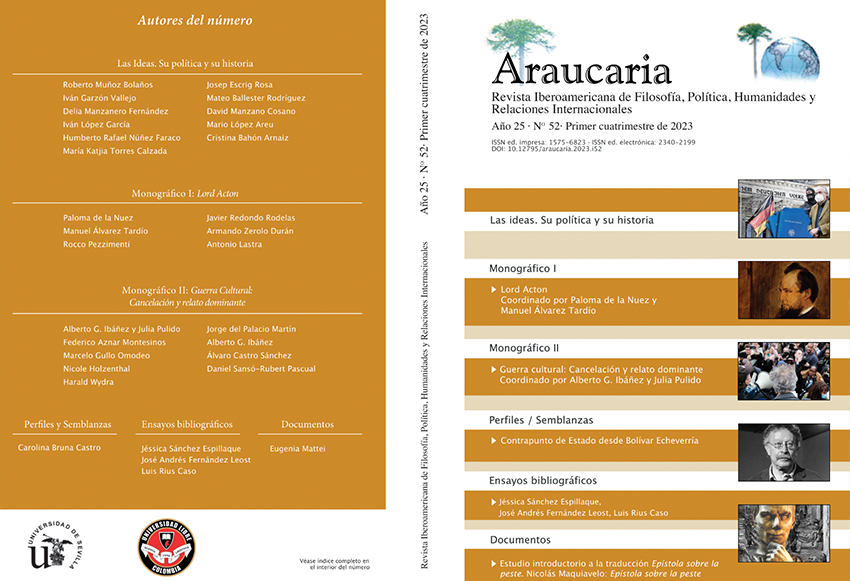Dies irae: ¿Por qué las democracias liberales no logran domesticar la ira y la violencia?
Dies irae: Why have liberal democracies failed to tame anger and violence?
DOI:
https://doi.org/10.12795/araucaria.2023.i52.02Keywords:
Protests, liberalism, democracy, recognition, thymosAbstract
The 21st century has been marked by countless street protests in different regions of the world that have been unleashed by dissimilable political circumstances. The article has two objectives: first, to propose the political emotions of rage, resentment and desire for recognition as interpretative categories of expressions of citizen dissatisfaction vis-à-vis contemporary politics. Secondly, to warn that the inability of liberal democracies to domesticate violence is one of the greatest failures of political modernity. Thus, from the critical reading of the most relevant contemporary political philosophers in the Western sphere, both objectives will show that the crisis of liberal democracies and capitalism has structural roots and demand the reinvention of the triumphant paradigm in 1989 known as the End of History.
Downloads
References
Aytac, Selim Erdem & Stokes, Susan, ¿Para qué molestarnos en hacer oír nuestras voces? Las razones que nos llevan a participar en elecciones y protestas, Buenos Aires, Siglo Veintiuno Editores, 2021.
Casanova, Julián. Una violencia indómita. El siglo XX europeo, Barcelona, Crítica, 2020.
Cortina, Adela. Aporofobia, el rechazo al pobre. Un desafío para la democracia, Barcelona, Paidós, 2017.
Dong-hyuk, Hwang (director). Squid Game, Netflix, 2021.
Fukuyama, Francis. “Thirty Years after The End of History? EAFIT Lecture”, Coherencia, vol. 34, No. 18 (2021), pp. 21-25. https://doi.org/10.17230/co-herencia.18.34.1
Fukuyama Francis. “The Pandemic and Political Order”, Foreign Affairs, July/August 2020, pp. 26-32.
Fukuyama, Francis. “What Kind of Regime Does China Have?”, The American Interest, May 18, 2020. https://www.the-american-interest.com/v/francis-fukuyama/
Fukuyama, Francis. “The Wages of American Political Decay”, The American Interest, May 4, 2020. https://www.the-american-interest.com/2020/05/04/the-wages-of-american-political-decay/
Fukuyama, Francis. Charles Davidson & Jeffrey Gedmin, “The last man and the future of history”, The American Interest, vol. XIV, No. 6, July/August, 2019. https://www.the-american-interest.com/2019/05/03/the-last-man-and-the-future-of-history/
Fukuyama, Francis. América en la encrucijada. Democracia, poder y herencia neoconservadora, Barcelona, Ediciones B, 2007.
Fukuyama, Francis. El fin de la Historia y el último hombre. Bogotá, Planeta, 1992.
Fukuyama, Francis. “The End of History?”, The National Interest, Summer, 1989.
Garzón Vallejo, Iván. ¿El fin del liberalismo?, en Adolfo Eslava & Jorge Giraldo (coordinadores). Pensar la crisis. Perplejidad, emergencia y un nuevo nosotros. Medellín: Editorial EAFIT, 2020, pp. 39-48.
Garzón Vallejo, Iván. “Filosofía pública para un mundo de ganadores y perdedores”, El Espectador, 2 de diciembre de 2021, pp. 14-15.
Garzón Vallejo, Iván. “El asalto del populismo”, Contexto, 14 de enero de 2021. https://contextomedia.com/el-asalto-del-populismo/
Giraldo Ramírez, Jorge. “Corazones partidos. Una revaluación de las revueltas pasionales”, Coherencia, vol 18, No. 34 (2021), pp. 27-48. https://doi.org/10.17230/co-herencia.18.34.2
Harari, Yuval Noah. “The world after coronavirus”, Financial Times, 20 March, 2020. https://www.ft.com/content/19d90308-6858-11ea-a3c9-1fe6fedcca75
Ho, Bong Joon (Director). Parasite. Netflix, 2021.
Iglesias, Analía. “Lo que vuelve con más fuerza que el coronavirus: las protestas ciudadanas globales”, El País, 4 de diciembre de 2021. https://elpais.com/planeta-futuro/2021-12-05/lo-que-vuelve-con-mas-fuerza-que-el-coronavirus-las-protestas-ciudadanas-globales.html
Joas, Hans. War and Modernity. Cambridge, Polity Press, 2003.
Lewis, C.S. La abolición del hombre. Reflexiones sobre la educación, Barcelona, Editorial Andrés Bello, 2000.
Milanovic, Branco. “The Clash of Capitalisms”, Foreign Affairs, January-February 2020, pp. 10-21.
Pearce, Jenny. Politics without Violence? Towards a Post-Weberian Enlightenment, Cham, Palgrave Macmillan, 2020. https://doi.org/10.1007/978-3-030-26082-8
Roubini, Nouriel. “The Main Street Manifesto”, The Project Syndicate, Jun 24, 2020. https://www.project-syndicate.org/commentary/main-street-manifesto-for-covid19-crisis-by-nouriel-roubini-2020-06
Sandel, Michael J. The Tyranny of Merit. What´s become of the Common Good? New York: Farrar, Straus and Giroux, 2020.
Schmitt, Carl. El Leviathan en la teoría del Estado de Tomas Hobbes, Granada, Comares, 2004.
Scurati, Antonio. M. El hijo del siglo, Madrid, Alfaguara, 2020.
Sloterdijk, Peter. Estrés y libertad. Buenos Aires: Ediciones Godot, 2017.
Sloterdijk, Peter. Ira y tiempo. Ensayo psicopolítico. 2ª ed. Madrid: Siruela, 2017.
Todorov, Tzvetan. Insumisos. Barcelona: Galaxia Gutenberg, 2016.
Thomä, Dieter. Puer robustus. Una filosofía del perturbador. Barcelona: Herder, 2018.
Vargas Llosa, Mario. La llamada de la tribu. Bogotá, Alfaguara, 2018.
Vidal Liy, Macarena. “La mayor ola de ira desde Tiananmen”, El País, 8 de febrero de 2020, pp. 1-3.
Walzer, Michael. “What It Means to Be Liberal”, Dissent, Spring 2020. https://www.dissentmagazine.org/article/what-it-means-to-be-liberal?utm_source=Dissent+Newsletter&utm_campaign=5655cf6abe-EMAIL_CAMPAIGN_The_First_Democratic_Debates_COPY_0&utm_medium=email&utm_term=0_a1e9be80de-5655cf6abe-101938949
Ways, Thierry. “El próximo debate”, El Tiempo, 11 de junio de 2020, p. 1.13.
World Protests Platform. https://worldprotests.org/ 2021.
Downloads
Published
How to Cite
Issue
Section
License
Las ediciones impresa y electrónica de esta Revista son editadas por el Secretariado de Publicaciones de la Universidad de Sevilla, siendo necesario citar la procedencia en cualquier reproducción parcial o total.Salvo indicación contraria, todos los contenidos de la edición electrónica se distribuyen bajo una licencia de uso y distribución “Creative Commons Atribución-NoComercial-SinDerivar 4.0 Internacional”








